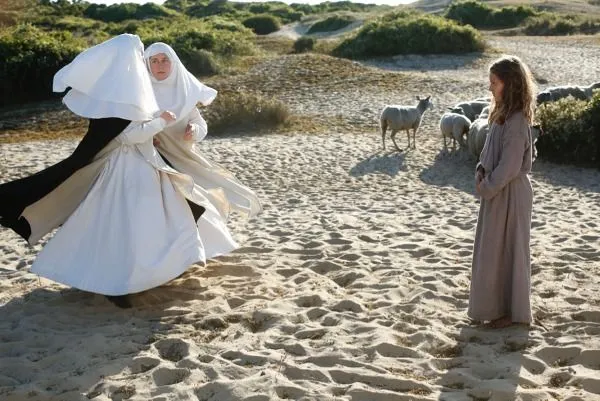Eye For Film >> Movies >> Jeannette: The Childhood Of Joan Of Arc (2017) Film Review
Jeannette: The Childhood Of Joan Of Arc
Reviewed by: Anne-Katrin Titze

After Camille Claudel, 1915, starring Juliette Binoche, and his absurdly funny Li'l Quinquin and outrageous Slack Bay (Ma Loute), Bruno Dumont astonishes us with Jeannette, L'Enfance De Jeanne D’Arc (Jeannette, The Childhood Of Joan Of Arc). The selection of music and the choice of lyrics form a mix that is trance-like, brave and defiant, just like Joan, our heroine.
The dynamic performances, the sung dialogue (about questions of faith of all things), and the fact that two people are referred to as one character in Madame Gervaise (played by the film's co-composers Aline Charles and Elise Charles) constitute the dynamics of this reiteration of a Dumont universe.

At times, little Jeannette (Lise Leplat Prudhomme) looks up straight into the camera and addresses God. Our position, helpless, watching from the audience, curious what this defiant girl demands, turns us into an unexpected, stupefied deity. Her friend Hauviette (Lucile Gauthier), a more conventional believer, performs her heart out just as much.
It is the contrast that stuns, between the early 21st century girls and music, the turn of the 20th century text, and the 15th century subject matter that never ceases to be urgent. "More wounded, more sick, more suffering" will exist until "someone kills war." As is well known, that someone, who prays for this warlord has to become the warlord herself.
Jeannette, L'Enfance De Jeanne D’Arc is faithful to the words of Charles Péguy on the childhood of the young Joan of Arc and once you accept Dumont's wild setup and his unorthodox approach, the fun can begin. The marvelous, timeless landscape by the sea (who cares that it looks nothing like the place where the actual Joan grew up?), the serpentine brook in which her sturdy horse walks, the pettish commentary by the sheep intercepting the rhythms - all beguiles us to sink deeper into the text of Péguy. The poet/philosopher's father was a carpenter, he found nothing more honourable than work. Péguy died in combat during the early days of the First World War.
How do we really imagine the life of saints? What were children like in the 15th century? "You cannot love them, love them anyway," is the maxim. The year is 1425 and the Hundred Years' War is tearing France apart. Not that we see any battles on screen. Jeannette takes us to the seaside in the middle of the summer where the sheep haven't changed much in almost six centuries. Their meehs punctuate the thoroughly 21st century music that is sung live by the stone-faced performers.
Eternal greatness encounters sacrifice and the film dares to musically tackle questions of complicity in evil. Péguy's socialism, patriotism, and Catholicism mix well with the eager young actors. This is unlike any film you have ever seen.
A vision of three saints, suspended in a tree, as you would have imagined them in childhood, aids Jeannette along the way. Saint Michel (Anaïs Rivière), Saint Catherine (Elise Charles) and Saint Marguerite (Aline Charles) are pure cinema. They live in the place where miracles still happen. Time lapses and we get to meet an older Jeanne (Jeanne Voisin), as always dressed in blue, and an older Hauviette (Victoria Lefebvre) and they prepare for her to leave home, accompanied by her uncle (Gery De Poorter).
The history of trying to understand the divine is long and winding - from passion plays to The Sound Of Music. Head-banging, twirling, somersaults and jazz-hands can do the trick. As characters in Slack Bay phrased it so eloquently, "We know what to do but we do not do." Jeannette does do.
Reviewed on: 02 Apr 2018
















